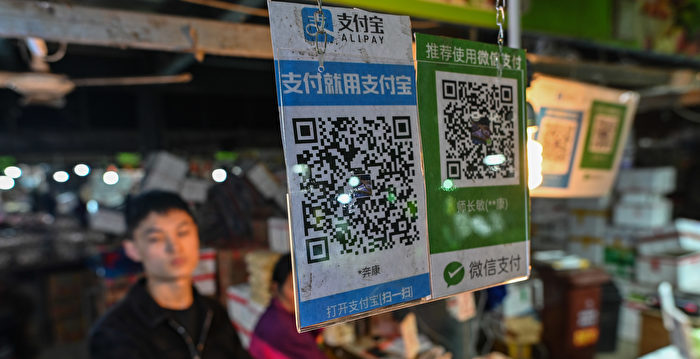[Epoch Times November 30, 2021]The Chinese Communist Party recently issued a notice on the regulation of bar code payment, in which bar code payment, which is frequently used by the public, has also been regulated. Some analysts believe that the CCP withdraws part of the payment functions of these platforms in preparation for the implementation of RMB digitalization.
The “Daily Business News” reported on November 29 that “From March 1 next year, WeChat and Alipay personal collection codes cannot be used for business collections” recently rushed to hot searches and swiped the screens on major social platforms.
Last month, the official website of the Central Bank of the Communist Party of China issued the “Notice on Strengthening the Management of Payment Acceptance Terminals and Related Services” (hereinafter referred to as the “Notice”), which put forward specific requirements on the management of payment acceptance terminals, management of special merchants, and monitoring of acquiring services. It will be implemented on March 1, 2022.
Regarding the personal payment barcodes that have been widely used in recent years, the “Notice” has made specific provisions on its use specifications, mainly focusing on formulating a classification management system for payment barcodes, prohibiting personal static payment barcodes from being used for remote non-face-to-face payment collection, It is not allowed to use personal payment barcodes for business activities related payment services and other aspects.
According to market analysis, the distinction between personal code and merchant code is currently based on the new regulations. WeChat Pay, Alipay and Cloud QuickPass, which provide the payment code, are responsible for this responsibility. It remains to be seen whether to make the distinction, whether to formulate the rules uniformly, or whether each family makes a distinction on its own.
An industry veteran said that there must be a difference between the personal code and the merchant code in terms of rates. The merchant code fee rate (which can be understood as a handling fee) is much higher than that of the personal code.
According to data, the current offline scan code payment market includes three major categories of merchant codes, personal codes, and third-party aggregate payment provided by giants. The annual scale of the scan code payment market is about 40 trillion to 50 trillion yuan, of which aggregation The payment is about 15 trillion yuan.
A person in charge of a payment company said, “It depends on whether you are engaged in commercial activities, such as building a pancake stall and sticking the payment code to the side to collect payment. For such commercial activities, personal payment code cannot be used to collect payment. Similar to For commercial activities with frequent transactions, you need to apply for a merchant code at payment institutions such as Alipay and WeChat, and use the merchant code to collect payments.”
At the same time, large state-owned banks are quietly promoting the digital renminbi. According to Reuters, state-owned banks provide consumers with payment methods other than Alipay and WeChat Pay. “People will realize that digital renminbi payment is very convenient, and they no longer have to rely on Alipay or WeChat payment.” said a bank manager who participated in the Shanghai digital renminbi application pilot.
Current political commentator Zhang Tianliang analyzed in his self-media program that the Chinese authorities took this opportunity to crack down on platforms such as Alipay and WeChat Pay because these platforms have absolute monopoly advantages in the payment field and have become a monopoly in finance and big data. Institutions, this is unacceptable for the CCP. In addition, the authorities cracked down on these payment platforms and took back the payment functions of these platforms to prepare for the implementation of RMB digitization.
Editor in charge: Li Jing#
.
